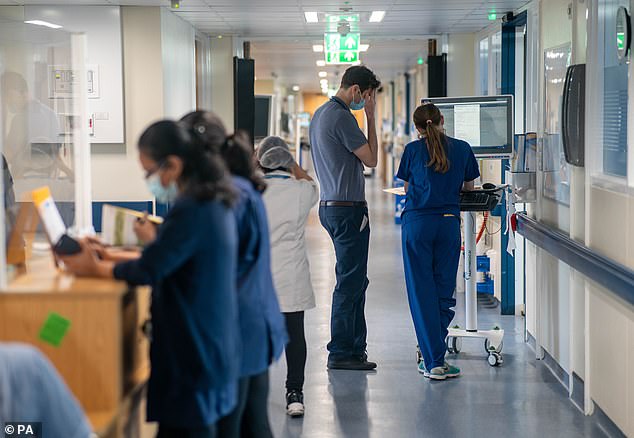Failing to invest adequately in general practice and social care is one of the biggest policy mistakes of the last 30 years, a report says today.
England’s health and care system must be “radically reorientated” away from hospitals to be “effective and sustainable”, it adds.
The King’s Fund, a health think tank that produced the report, argues that officials should put primary and community services at the centre.
It highlights that the “vast majority” of NHS interactions are with GPs, pharmacists and district nurses.
But taxpayer money and staff have been disproportionately directed toward hospitals, leading to inefficiencies and delays.
The figures, combined with the fact that an average of 46,201 staff a day were off work sick last week, mean the NHS is under increasing pressure heading into December, experts have warned.
The authors urge health chiefs to move more care “closer to home” and emphasize that the “answer to overcrowded hospitals is not more hospitals.”
They warn that patients who struggle to get appointments with their GP risk their condition deteriorating and having to seek urgent help in already overloaded A&E.
There are currently more than 876,164 GP appointments on the NHS each day, an increase of 34,219 since 2018/19.
But despite this increase in demand (and repeated promises to boost out-of-hospital care), the proportion of Department of Health and Social Care spending on primary care has actually fallen from 8.9 per cent in 2015/16. to 8.1 percent in 2021. 22.
This has fueled the daily 8am scramble for a GP appointment and contributed to patient satisfaction with general practice plummeting.
In 2021/22, the largest proportion of spending, £83.1 billion, went to acute hospitals, while primary care received just £14.9 billion.
The NHS has received additional money in recent years, but while acute hospital trusts have seen their funding grow by 27 per cent since 2016/17, community trusts have benefited from only half that level of growth, 14 percent.
Staffing trends reveal a similar pattern: the number of NHS consultants increased by 18 per cent between 2016/17 and 2021/22, while the number of GPs increased by just 4 per cent over the same period , according to the report.
There has also been a significant increase in social care staff vacancies, from 110,000 in 2020/21 to 152,000 in 2022/23.
Researchers say progress has been hampered by “urgent challenges” such as A&E wait times and delays in planned care, which are often the priority of politicians “tempted by quick fixes rather than fundamental improvements.” “.
Other factors include a lack of data on primary and community services, leading to a “cycle of invisibility”, and funding streams that prioritize hospitals.
The King’s Fund warns that strengthening primary and community care should not mean closing hospitals, pointing out that England already has fewer hospital beds per capita than other nations.
Instead, it calls for future funding to be directed towards a “comprehensive plan to reorient the health and care system towards primary and community care”.
They warn that a piecemeal approach to selective policies “will not miraculously unlock change.”
Sarah Woolnough, chief executive of The King’s Fund, said: “Many people across the country will have personal experience of struggling to get a GP appointment, trying to contact other services and, when all the roads, reluctantly going to the emergency room.
‘It seems like all roads lead to the hospital, but our hospitals are already full.
‘To achieve an effective and sustainable health and care system, politicians and national leaders must embark on a radical and widespread reorientation of the health and care system towards primary and community services.
“Doing so will free up hospitals to treat the patients they are best positioned to treat, as many more people will be diagnosed and cared for in the community.”
Beccy Baird, senior researcher at The King’s Fund and lead author of the report, said: “Like other countries, England needs to bend the curve of the projected increase in demand for high-cost, reactive hospital care.”
‘That means supporting people to look after their health and wellbeing, intervening early and keeping them healthy at home for as long as possible, which can only be achieved by strengthening primary and community services.
“While these changes may not deliver the quick savings that many wrongly expect, the alternative is to build more expensive hospitals to address acute needs that could have been prevented or better managed in the community.”
The report says officials should encourage staff to work in primary and community services by offering them more pay and career progression; leaders must be accountable for overall patient care, rather than focusing on the waiting list; and calls for a reform of the “weakened” social assistance system.
Saffron Cordery, deputy chief executive of NHS Providers, which represents NHS trusts, said care delivered in the community is “too often overlooked when headlines and political priorities focus on a narrow set of acute targets”.
He added: “But prevention is better than cure and, with the right funding and workforce, community, primary and social care can play an essential role.”

